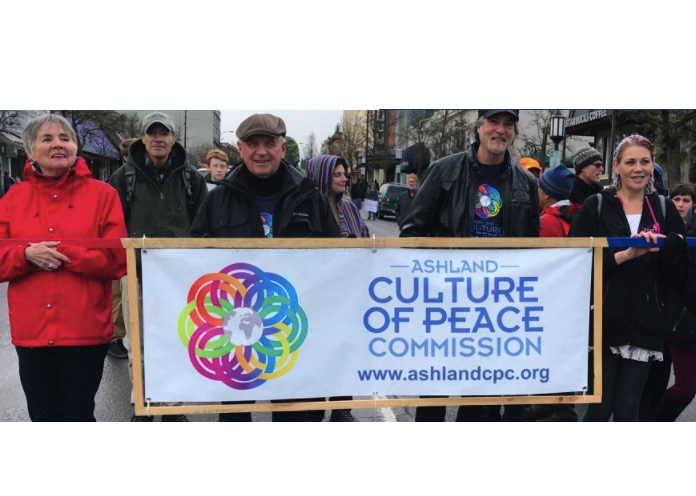. . DEMOCRATIC PARTICIPATION . .
An article by David Wick for the Ashland Daily Tidings
From its inception, the Ashland Culture of Peace Commission (ACPC) has been a local–global initiative. Some people refer to this as, “think globally and act locally,” or vise versa. In the case of ACPC and the city of Ashland, the Culture of Peace model we are developing is of interest far beyond Southern Oregon and does have an impact on national and international levels.

For many months Bob Morse of ACPC has written articles which were developed through conducting interviews with people representing various sectors of our local community. Each article provided a different view of a Culture of Peace and hinted at a new emerging model. This has been informative and generated dynamic conversations and new thinking with article titles ranging from, “Nourishing our children and ourselves” and “Peace through feeding the hungry” to “Bringing peace to healing”.
Over the next several months ACPC will begin a new series of articles which focus on the national and international evolution of a Culture of Peace and the important role Ashland and ACPC play in this vital global initiative. The variety of authors have made important contributions toward shifting mindsets and behaviors in their spheres of influence. These leaders are also very aware of the developing peacebuilding activities taking place in Ashland and will reflect upon the importance of what we are doing from their perspective.
The authors currently include: Bangladeshi Ambassador Anwarul Karim Chowdhury, the United Nations; David Adams, Culture of Peace News Network; Dot Maver, National Peace Academy; Avon Mattison and Tezikiah Gabriel, Pathways To Peace; Fred Arment, International Cities of Peace; and David Hazen, Eugene Peace Team.
(article continued in right column)
How can culture of peace be developed at the municipal level?
(article continued from left column)
On May 16, 2017 the Ashland City Council joined the International Cities of Peace and proclaimed Ashland a City of Peace. This created a focus to work toward that goal. In part the proclamation states, “Official recognition of
Ashland as an International City of Peace will provide inspiration for all citizens to create an emerging, evolving, living model for thriving together as fellow humans. NOW, THEREFORE, the City Council and Mayor, on behalf of the citizens of Ashland, do proclaim that the City of Ashland, Oregon, is a City of Peace in perpetuity and encourage city and community leaders to work with concerned citizens to develop policies and procedures that promote a culture of peace in our region.”
What does this matter, one may ask; we have real problems at home, why look outside of Ashland? In the April 10, 2016 Daily Tidings article titled “Ashland Culture of Peace Commission: Does Ashland matter globally?” Fred Arment, executive director of the international Cities of Peace answered this question directly.
“I want to emphasize that Ashland is ahead of the curve. I have a lot of communication with cities around the world, and you guys are definitely ahead of the curve on all of this!” declared Arment. “You have basically made a very sophisticated approach involving political with grassroots organizations and done it in a way that has integrity and promise, unity and purpose. You guys are leading the pack, and I’m really interested in doing a case study of your city and your approach for the rest of the world to see.”
Arment continued, “Just the idea of your being in the United States — and for peace — gives encouragement and support to other cities around the world. So it’s not just Ashland that you are dealing with. When Ashland proclaims that it is a City of Peace, other cities in war-torn areas see that as a way forward. So it’s very powerful!”
Dedicated people, time, energy and money will be required to walk the pathway to co-creating a Culture of Peace in Ashland and elsewhere. We are not talking about a few changes here and there. We are talking about new models. In large part Buckminster Fuller identified our pathway when he said, “You never change things by fighting the existing reality. To change something, build a new model that makes the existing model obsolete.”
Ashland does matter globally. ACPC is planning to install the World Peace Flame in Ashland in 2018, and convene a global peace conference here in 2019. Let us be clear: There are positive leadership and economic implications for Ashland as our reputation grows as an innovative International City of Peace. Most important, a Culture of Peace is a living legacy which our children, grandchildren and future generations can build upon. Please join us!
— David Wick is executive director of the Ashland Culture of Peace Commission. Email comments and questions to ashlandcpc@gmail.com. The ACPC website is www.ashlandcpc.org; like the commission on Facebook at www.facebook.com/AshlandCultureofPeaceCommission; follow twitter.com/AshlandPeace on Twitter. All are welcome to join the ACPC’s Talking Circle at 11 a.m. each Tuesday and Community Meeting at 4 p.m. each Wednesday, both at the ACPC oice, 33 First St., Suite 1, diagonally across Lithia Way from the Ashland Post Oice.